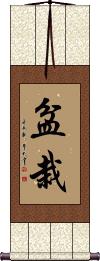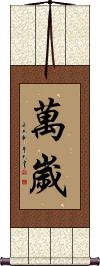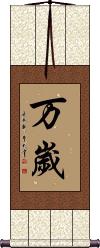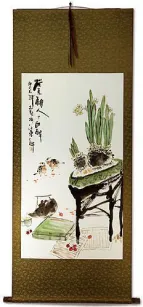Many custom options...
And formats...

Bonsai in Chinese / Japanese...
Buy a Bonsai calligraphy wall scroll here!
Personalize your custom “Bonsai” project by clicking the button next to your favorite “Bonsai” title below...
Bonsai / Penzai
Dwarf Tree Culture
盆栽 is the word that refers to the culture, hobby, and to miniature trees themselves that have become popular around the world.
Like many things, this art migrated from China to Japan some time ago, but we tend to associate it with Japanese culture and even use the Japanese word in English.
Granted, in the present day, this hobby seems to be more popular in Japan but still has a great following in China and even a little in Korea as well.
Note: Many people confuse the title of the bonsai tree with “banzai” which is a form of “hooray” in Japanese. I have also seen it misspelled as “bansai.” The correct Romanization (Romaji) is “bonsai.”
Banzai / Wansui
Old Japanese / Traditional Chinese & Korean
萬歲 is the traditional Chinese, Korean Hanja, and ancient Japanese way of writing banzai.
In modern times, the first character was simplified in Japan and China. So you might want to select the other entry for universal readability.
While it has become a popular, if not an odd, thing to scream as you jump out of an airplane (preferably with a parachute attached), banzai is actually a very old Asian way to say “hooray.” The Japanese word “banzai” comes from the Chinese word “wan sui,” which means “The age of 10,000 years.” It is actually a wish that the Emperor or the Empire live that long.
Imagine long ago when the Emperor made a rare public appearance. 萬歲 is what all people would yell to their leader in respect.
So if you like it as a hooray, or you want to wish someone that they live for 10,000 years, this is the calligraphy for you.
Other translations include Cheers! (not the drinking kind), hurrah!, long live [name]!, and congratulations!
To other things with banzai in their names, I am still waiting for the promised sequel to Buckaroo Banzai.
Notes: Sometimes people confuse banzai with bonsai. A bonsai is a miniature tree. They have nothing to do with each other.
Banzai
Modern Japanese Version
万歲 is the modern Japanese way to write banzai.
We've made two almost identical entries for this word, with just a variation on the first character. In the last century, 萬 was simplified to 万 in Japan and China. The new generation will expect it to be written as 万 but the old generation can still read the more traditional 萬 form. You must make your determination as to what version is best for you. If your audience is mostly Japanese, I suggest 万歲.
While it has become a popular, if not an odd, thing to scream as you jump out of an airplane (preferably with a parachute attached), banzai is actually a very old Asian way to say “hooray.” The Japanese word “banzai” comes from the Chinese word “wan sui” which means “The age of 10,000 years.” It is actually a wish that the Emperor or the Empire live that long.
Imagine long ago when the Emperor made a rare public appearance. This is what all of the people would yell to their leader in respect.
So if you like it as a hooray, or you want to wish someone that they live for 10,000 years, this is the calligraphy for you.
To other things with banzai in their names, I am still waiting for the promised sequel to Buckaroo Banzai.
Other translations: hurrah, long life, congratulations, cheers, live long.
Notes: Sometimes people confuse banzai with bonsai. A bonsai is a miniature tree. They have nothing to do with each other. Further, Bonzai is not a word at all - although it would make a great name for a calcium supplement for older people.
This in-stock artwork might be what you are looking for, and ships right away...
Gallery Price: $178.00
Your Price: $98.88
Not the results for bonsai that you were looking for?
Below are some entries from our dictionary that may match your bonsai search...
| Characters If shown, 2nd row is Simp. Chinese |
Pronunciation Romanization |
Simple Dictionary Definition |
盆栽 see styles |
pén zāi pen2 zai1 p`en tsai pen tsai bonsai ぼんさい |
More info & calligraphy: Bonsai / Penzaibonsai; miniature potted plant; (place-name) Bonsai |
五葉 五叶 see styles |
wǔ shě wu3 she3 wu she goyou / goyo ごよう |
(abbreviation) (See 五葉松) Japanese white pine (favored for gardens and bonsai); goyoumatsu; (given name) Goyou five petals |
凡哉 see styles |
bonsai ぼんさい |
(given name) Bonsai |
凡才 see styles |
bonsai ぼんさい |
(ant: 天才) mediocrity; ordinary ability |
梵妻 see styles |
bonsai ぼんさい |
Buddhist priest's wife |
水盤 see styles |
suiban すいばん |
shallow bowl for displaying flowers, bonsai, etc. |
添配 see styles |
tenpai てんぱい |
ornament, etc. accompanying a bonsai |
盆景 see styles |
pén jǐng pen2 jing3 p`en ching pen ching bonkei / bonke ぼんけい |
bonsai; landscape in a pot miniature garden; tray landscape |
盆梅 see styles |
bonbai ぼんばい |
plum bonsai |
貴風 see styles |
kifuu / kifu きふう |
class size of bonsai trees (25-35cm); (personal name) Kifū |
遣水 see styles |
yarimizu やりみず |
(irregular okurigana usage) (1) stream (in a Japanese garden); narrow stream flowing through a traditional garden (esp. in a Heian period villa); (2) watering (potted plants, bonsai, etc.); (surname) Yarimizu |
鉢物 see styles |
hachimono はちもの |
(1) food served in bowls; (2) potted plant; bonsai |
五葉松 see styles |
goyoumatsu / goyomatsu ごようまつ |
Japanese white pine (favored for gardens and bonsai) |
水橫枝 水横枝 see styles |
shuǐ héng zhī shui3 heng2 zhi1 shui heng chih |
cape jasmine (Gardenia jasminoides), esp. grown as bonsai |
赤玉土 see styles |
akadamatsuchi あかだまつち |
red soil aggregate; akadama; clay-like volcanic ash soil (used for bonsai, etc.) |
遣り水 see styles |
yarimizu やりみず |
(1) stream (in a Japanese garden); narrow stream flowing through a traditional garden (esp. in a Heian period villa); (2) watering (potted plants, bonsai, etc.) |
鉢映り see styles |
hachiutsuri はちうつり |
compatibility between the pot and the bonsai |
Variations: |
yarimizu やりみず |
(1) (See 寝殿造り) stream (in a Japanese garden); narrow stream flowing through a traditional garden (esp. in a Heian-period villa); (2) watering (potted plants, bonsai, etc.) |
The following table may be helpful for those studying Chinese or Japanese...
| Title | Characters | Romaji (Romanized Japanese) | Various forms of Romanized Chinese | |
| Bonsai Penzai | 盆栽 | bon sai / bonsai | pén zāi / pen2 zai1 / pen zai / penzai | p`en tsai / pentsai / pen tsai |
| Banzai Wansui | 萬歲 万岁 | banzai / manzai | wàn suì / wan4 sui4 / wan sui / wansui | |
| Banzai | 万歲 / 萬歲 万岁 | banzai | wàn suì / wan4 sui4 / wan sui / wansui | |
| In some entries above you will see that characters have different versions above and below a line. In these cases, the characters above the line are Traditional Chinese, while the ones below are Simplified Chinese. | ||||
Successful Chinese Character and Japanese Kanji calligraphy searches within the last few hours...








